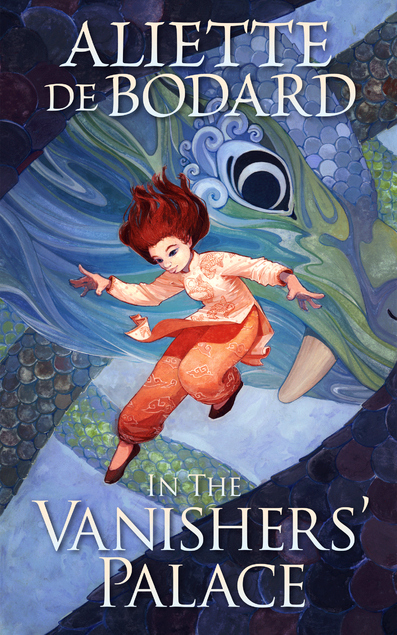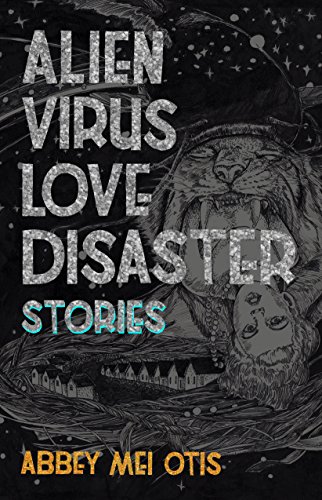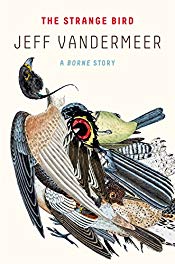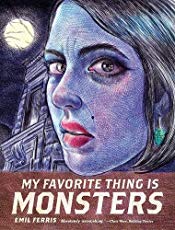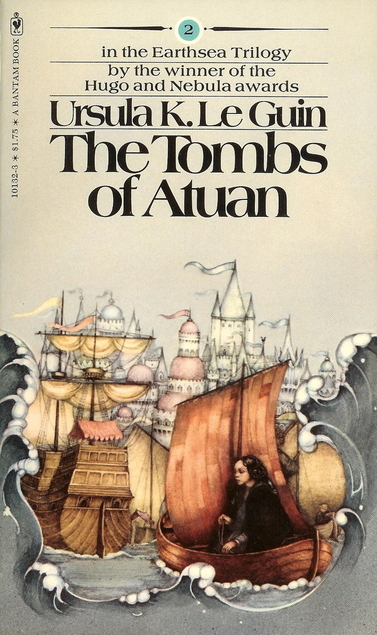A Burglar’s Guide to the City by Geoff Manaugh: Describes burglars and their relationship to architecture and cities and those who try to foil them (cops, safe makers, architects, etc). I especially liked the chapter in which the author met with members of various lock picking societies. A quick and enlightening read chockablock full of fantastic detail.
Midnight at the Well of Souls by Jack L. Chalker: They just don’t write science fiction like this anymore (or I’m looking in the wrong places). There’s almost too much creativity crammed into this book about an alien world divided into hexagons, each one of which has a completely different environment and set of alien creatures. I suppose that’s why Chalker wrote several more books. I enjoyed this crazy romp through this bizarro alien world and will probably read one or two more of these.
The Long Way to a Small, Angry Planet by Becky Chambers: A book that’s probably a lot more interesting than it sounds. The story of the interpersonal dynamic among a crew of alien races on a long distance space journey. The characters are charming, the alien races are unique and strange, and (in what was something of a relief, I realized) the characters solve their problems without the use of violence. This is one of those science fiction books that you could easily hand to both fans of science fiction and not and still find a receptive audience. I intend to read the sequels.
Neverworld Wake by Misha Pessl: I really enjoyed her first book a lot (Special Topics in Calamity Physics) and was delighted when I realized that she had written a couple new books. This is a YA novel with a time travel/Groundhog Day motif. I liked it a lot and I did not see the twist coming (to be fair, I usually don’t). A quick, enjoyable read (what I’m usually looking for when I pick up a YA novel).
The Doll’s Alphabet by Camilla Grudova: Do you like sewing machines? Because there are a lot of them in this book of short stories. These stories have a real Grimm’s fairy tale sort of vibe to them with an often pretty harsh (but fair) take on contemporary gender relationships. Bordering on the grotesque, Grudova has a real unique voice. I’ll be looking for more of her writing in the future.
Tales from Earthsea by Ursula K. Le Guin: If you like Le Guin’s other Earthsea books, you’d be missing out if you didn’t read this collection of Earthsea stories. Fills in some gaps in the novels in real interesting ways.
The Other Wind by Ursula K. Le Guin: The final Earthsea novel doesn’t disappoint. I think this was the only one (apart from the stories) that I hadn’t read before. Heartbreaking at times, this quiet novel was so deeply satisfying as a conclusion to the Earthsea story. Le Guin writes about the nature of power and the role of gender like no one else. I’m glad I read it when I did, because I think I would have got much less of it if I’d read it at a younger age.
Hellboy (Library Edition, v4): The Crooked Man and the Troll Witch by Mike Mignola: I liked the Troll Witch part of this one best, because Mignola’s still doing the art. The rest of it is fine, but Hellboy definitely loses something without Mignola doing the art. Funny thing about the Hellboy comics, I have a very hard time remembering details of the stories, even as the art remains vivid in my mind.
Battle Angel Alita (Deluxe Edition 2) by Yukito Kishiro: I still like this comic, but I don’t remember being as bothered by the grotesquerie of it when I read these the first time about 10 years ago.
A Distant Mirror: The Calamitous 14th Century by Barbara W. Tuchman: If you’re feeling real down about where the world is at, this history of 14th century Europe could be useful cure. It probably really was one of the worst times to be alive. Plague and violence and famine and daft kings were all the rage. Also, they wore really stupid looking shoes. There are incredible, just flabbergasting details in this book.
The Wicked & the Divine: Mothering Invention by Kieron Gillen: Really effective use of wordless panels, repeating almost identical actions over thousands of years really drive the point home about how much of a drag it would be to be immortal (or to experience reincarnation with the full memory of all that had happened before). I like this comic, but all the characters are such tools, I have a hard time loving it. (But then they are all gods/rock stars, so it kind of makes sense.) The art’s fantastic.
Rosewater by Tade Thompson: Science fiction novels about psi powers were all the rage in the 70s and 80s. I haven’t seen any for a while, but this book reminded me of them. Set in a town in Nigeria that’s been infested/visited by some alien thing, this novel’s brimming with ideas. In a fitting touch, the United States has completely cut off all ties and communication with the rest of the world, so much so that no one knows anything about what’s happening there, except for strange rumors from the occasional refugee. The story’s told non-chronologically, which works pretty well in this case.
Empty Set by Verónica Gerber Bicecci: This novel uses Venn (and other) diagrams to show the status of characters’ relationships. I never suspected that a couple circles could be so moving, but it turns out that with the right context, they can be. I picked this one up on a lark at the library and I’m glad I did.
John Dee and the Empire of Angels: Enochian Magicking and the Occult Roots of the Modern World by Jason Louv: Fascinating and weird. You don’t need to believe in magic to get a lot out of this book, because it’s clear that many of the people who rule the world do. It’s a weird (wyrd?), oblique take on how and why the world is where it’s at today. Sometimes I find it useful to get a curveball perspective on things.
Restart by Gordon Korman: My kid recommended this one to me, so I read it. The protagonist bonks his head and gets amnesia. Upon returning to school, he slowly learns that he was the school bully terrorizing almost everyone. It’s a kid’s book, but it’s exploring real interesting ideas around memory and identity. Who are we? The memories that we have about ourselves or the memories that other people have about us? Pretty heady stuff disguised as a pretty goofy a kid’s book.
The Dark Side of Innocence: Growing Up Bipolar by Terry Cheney: Pretty intense stuff. I’m still thinking about this one.
Stephen Florida by Gabe Habash: It’s about a wrestler who really wants to win at wrestling. I mean REALLY. Another book that suffers from a plot description, because it’s really all about the execution. I like how this guy uses his words.
Fallen Words by Yoshihiro Tatsumi: Charming fables set in medieval Japan. Light and funny.
Black Hammer (v1): Secret Origins by Jeff Lemire: Another round of alternate DC/Marvel heroes complete with decades worth of fictional comics continuity to draw from. These heroes have been forced to retire a farm that seems to be a pocket dimension they can’t escape from and their interpersonal relationships sure do suffer as a result! I’m interested to see where Lemire takes it.
A Hundred Thousand Worlds by Bob Proehl: Speaking of fictional comics continuity, Proehl created an entire fictional comic book industry (complete with characters) to provide the backdrop for this story about this mother and her kid traveling across the country doing comic book conventions. The professional cosplayers form a sort of Greek chorus. The mother’s relationship and concern for her kid I found pretty touching.
The Tangled Lands by Paolo Bacigalupi and Tobias S. Buckell: Four barely interconnected short stories set in a world of environmental catastrophe caused by unbridled use of magic. Dark and grim. I wanted the stories to be more interconnected than they were.
Rock Manning Goes for Broke by Charlie Jane Anders: A short (basically novella-length) post-apocalyptic story about a guy who survives for a while by being unconcerned with what happens to his body a la Youtube-style antics. The characters just sort of keep trying to live their lives as the world goes farther and farther down the tubes. Reminded me quite a bit of A Distant Mirror in that way.
Harrow County (Library Edition v1) by Cullen Bunn: She’s a witch! And the whole town’s not what it seems. I sure wasn’t expecting the curveball this book threw. The art’s exactly what this story needs. I’ll check out future collections.
Vita Nostra by Sergey and Marina Dyachenko: What if Hogwarts totally sucked and studying magic was a real drag? That’s basically the premise of this novel. I’m being super reductionist here and maybe unfairly so. I wouldn’t say I enjoyed this book, but I did find it compelling.
The Wild Storm: Michael Cray (v1) by Bryan Hill: I wanted to like this book more than I did, but I feel like it was kind of a rehash of stuff I’ve seen before. Michael Cray fights evil versions of classic DC heroes (Green Arrow, Aquaman, etc).
Battle Angel Alita (Deluxe Edition 3) by Yukito Kishiro: This is where Battle Angel Alita really starts to get weird. This is also where I started enjoying it a lot more when I read it the first time. The same is true this second time.
